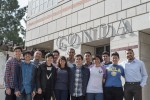As a first-year student, Jeffrey Wong often felt isolated by a lack of support available to him and other lesbian, gay, bisexual and trangender students in math and science fields. He said he felt he couldn’t be his full self in a world where it’s uncommon to be an LGBT individual with prehealth aspirations.
“Identity formation comes from finding others who share a common thread of experiences,” said Wong, then the only openly gay person in his fraternity and club volleyball team.
Wong, now a fourth-year human biology and society student, founded the Lavender Health Alliance in May. The alliance aims to create future health care professionals who are sensitive to LGBT individuals, he added.
“Lavender Health Alliance is the only LGBT South Campus organization,” Wong said. “LGBT undergraduates in general need greater avenues for professional as well as social development to meet more individuals like themselves.”
Wong said he thinks LGBT math and science students are in a difficult position because they need to find a community and process their sexuality while focusing on grades and school.
The Lavender Health Alliance provides its 39 undergraduate and graduate members with real life experience interacting with LGBT clients in clinics, graduate mentorship and a sense of community at its biweekly meetings.
During their general meetings, students share their experiences and give helpful advice, Wong said. In one of the organization’s first meetings, a student shared his coming out story, and two medical students shared their advice about what medical schools look for in applicants. In a previous meeting, members discussed anti-LGBT discrimination in the medical field.
Austin Beltrand, a third-year neuroscience and philosophy student, said he thinks the organization is important because it counters the stereotype that queer individuals are not interested in the sciences.
“This stereotype discourages LGBTQ involvement in health care during a time when many of the hardest issues that we face involve our bodily well-being, such as the HIV epidemic,” Beltrand said.
Wong said an average of two and a half hours are dedicated to LGBT training in the four years that students spend in medical school. He said he thinks their little training contributes to physicians’ discomfort when discussing sexuality in a professional setting.
Sean Reid, treasurer and secretary of the Lavender Health Alliance, said his experiences as an LGBT individual have provided him a broader outlook on health in general.
“I have felt first-hand what it’s like to receive discrimination in an environment that should be strictly health related,” said Reid, a second-year psychobiology and political science student. “Health doesn’t discriminate, diseases don’t discriminate. So why should health care discriminate?”
This quarter, Wong plans to reach out to more undergraduate students interested in psychology and careers dealing with mental health. The organization currently partners with graduate students from LuskinPRIDE, an LGBT group in the Luskin School of Public Affairs.
Reid said he hopes LGBT students in the future will not face discrimination when applying to medical school.
“My hope is that one day, the world will come to accept the LGBT community so much that people do not have to worry about closeting themselves,” Reid said.
Wong said the group will host an LGBT Patient Panel on Jan. 14 and a trip to Los Angeles County Museum of Art on Jan. 16. The group meets every other Monday at 5 p.m. in Gonda Neuroscience and Genetics Research Center 5303.
